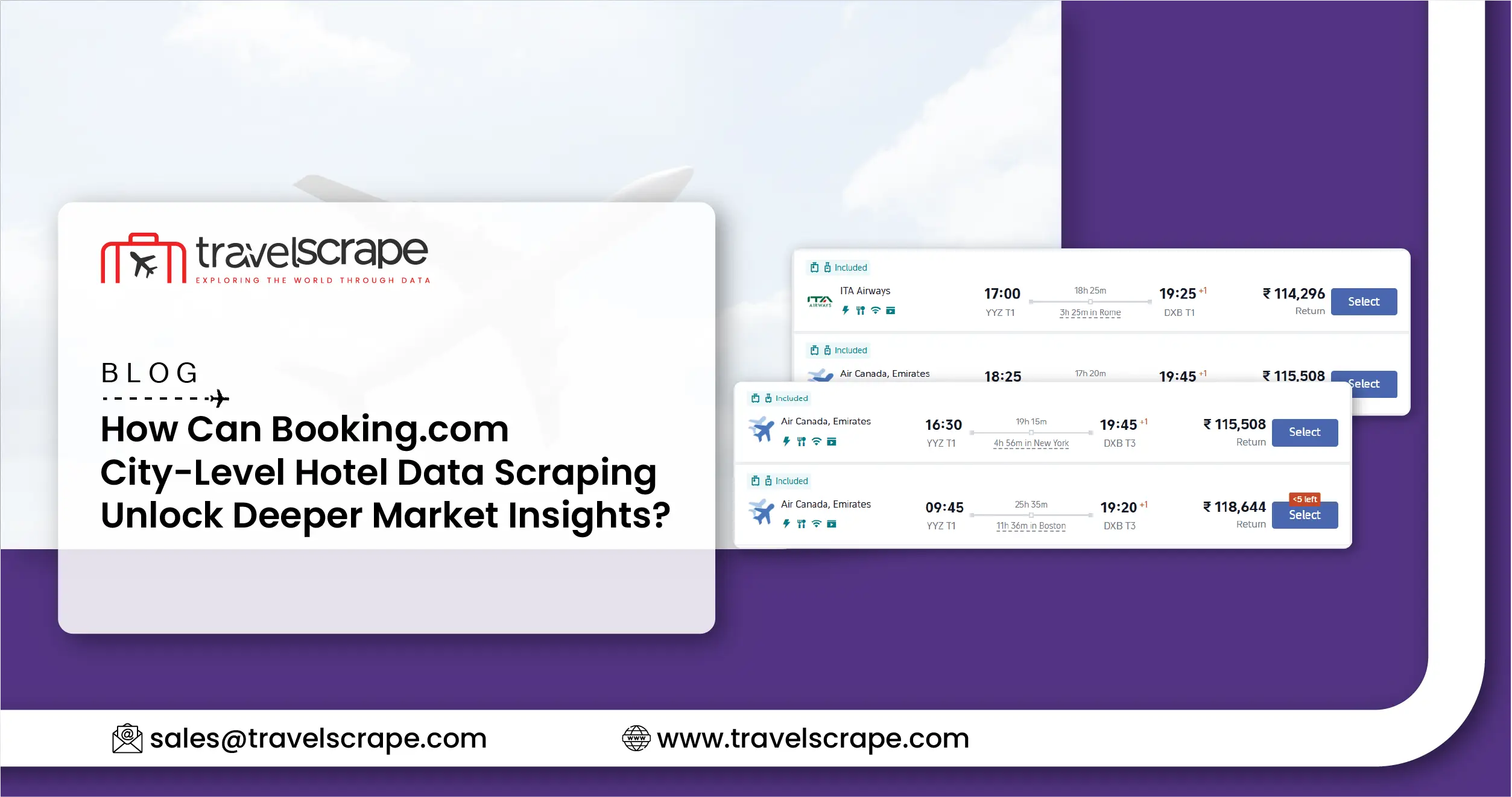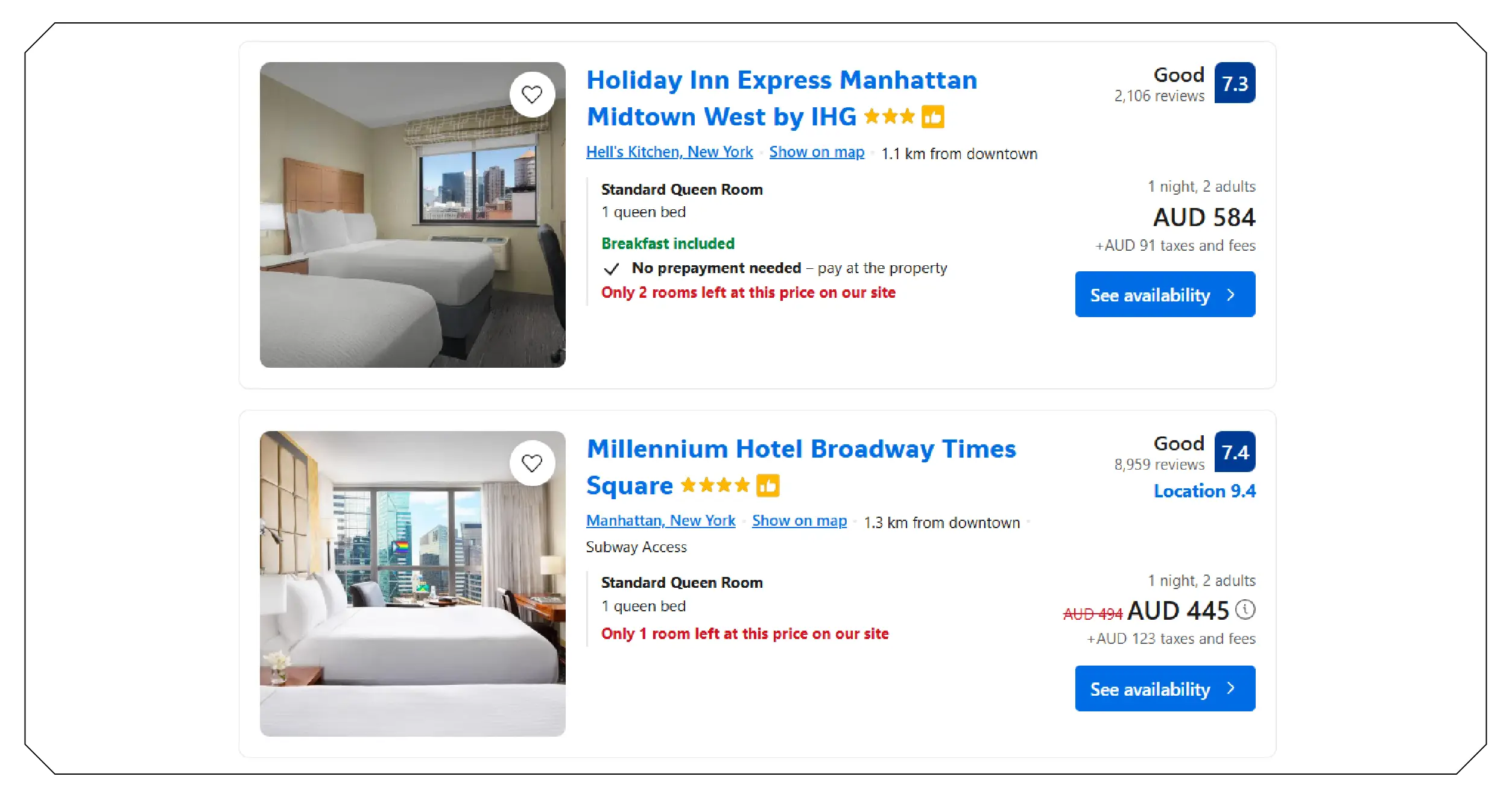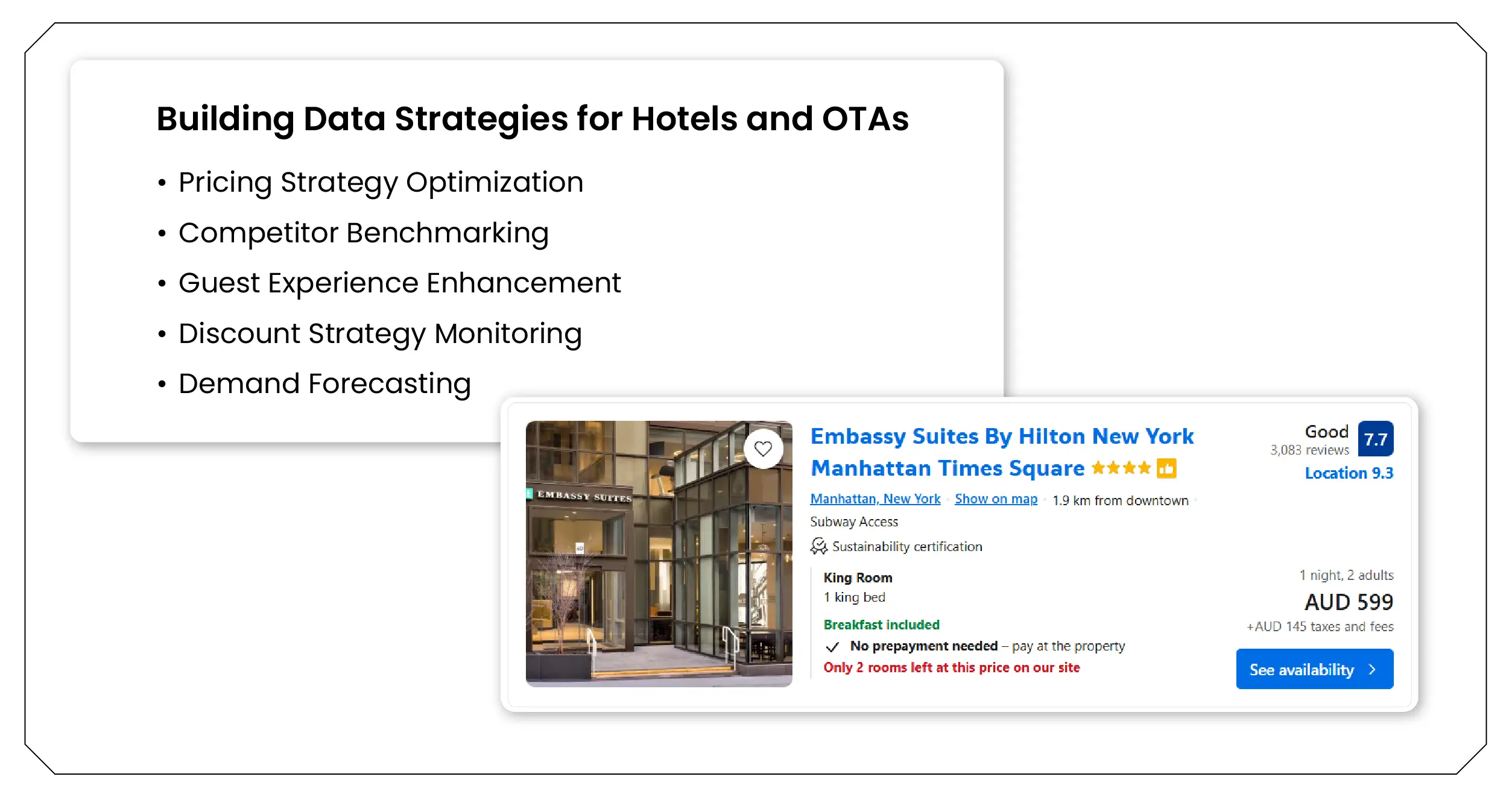How Can Booking.com City-Level Hotel Data Scraping Unlock Deeper Market Insights?

Introduction
In today’s fast-evolving hospitality industry, gaining detailed, structured insights into city-specific hotel markets has become essential for travel platforms, revenue managers, and market analysts. Our expertise in Booking.com city-level hotel data scraping enables businesses to track real-time hotel listings, pricing, availability, and guest reviews with unmatched accuracy. By building comprehensive datasets, companies can decipher customer preferences, track market fluctuations, and enhance their competitive positioning. Furthermore, with access to the Booking.com Guest Reviews Dataset , brands can uncover patterns in consumer feedback, improve service delivery, and design personalized experiences for target audiences.
Our advanced solutions specialize in Hyperlocal hotel data scraping from Booking.com, offering granular datasets that capture not just national or regional-level trends but city-specific nuances critical for decision-making. One of the core advantages lies in generating a reliable Booking.com Hotel Room Rates Dataset, which helps revenue managers analyze seasonal shifts, room category pricing, and competitor strategies. These data-driven insights open new doors for optimizing occupancy, revenue, and guest satisfaction.
Why City-Level Hotel Data Matters in Hospitality?

In hospitality, precision is key. City-level data provides a unique lens for viewing hotel performance in highly competitive urban markets. Through Web scraping Booking.com city hotel listings, businesses can capture valuable insights such as location-specific demand, property amenities, and service offerings. These details help identify which factors influence travelers’ booking decisions in major hubs versus secondary cities.
Moreover, with the ability to Extract Booking.com Pricing and Discounts Data , travel aggregators and hotel chains gain the tools to understand competitors’ dynamic pricing models. For example, insights into limited-time offers, discount strategies, and package deals enable businesses to respond more quickly, ensuring they remain relevant to price-sensitive travelers. In a sector where rates fluctuate daily, continuous monitoring provides a strategic advantage.
Turning Data into Competitive Intelligence
Another critical aspect of city-level insights is the ability to conduct Booking.com hotel availability and pricing extraction by city. This process empowers businesses to track not only hotel room supply but also availability during peak travel seasons, festivals, or business events. Monitoring availability patterns helps in forecasting demand surges and optimizing room allocations accordingly.
In addition, our solutions deliver structured Booking.com Price Trends Dataset outputs, which capture historical and real-time data. By analyzing these datasets, businesses can forecast pricing trends, detect anomalies, and plan long-term revenue strategies. The ability to benchmark price shifts against demand indicators provides clarity into competitive positioning within the city-level marketplace.
Leveraging Reviews and Ratings for Customer Insights
Consumer sentiment is a powerful driver of hotel performance. With Booking.com city hotel reviews and ratings scraping, businesses gain visibility into guest satisfaction across multiple properties in a city. Reviews not only reveal strengths, such as excellent customer service, but also expose recurring pain points, including cleanliness issues or check-in delays.
When combined with structured ratings data, reviews become a goldmine for sentiment analysis. Businesses can track changes in guest expectations over time and fine-tune their offerings accordingly. Hotels with consistently high ratings in a particular city can be benchmarked against their competitors to identify operational practices that contribute to their success. This direct customer voice empowers hoteliers to enhance service delivery, while online travel agencies (OTAs) can refine their recommendation algorithms to match user expectations more accurately.
Applications Across Industries
The value of Booking.com city-level hotel datasets extends beyond hotel operators. Consider travel startups that require real-time hotel availability feeds to provide innovative booking solutions. Or destination marketing organizations that analyze booking patterns to tailor promotional campaigns. Even financial institutions leverage hotel datasets as indicators of urban economic activity.
Through hyperlocal insights, businesses of all scales—from boutique hotels to global chains—can gain the clarity needed to thrive in an increasingly competitive landscape.
Building Data Strategies for Hotels and OTAs

- Pricing Strategy Optimization: By analyzing structured datasets, such as the Booking.com Hotel Room Rates Dataset , hotels can track competitor pricing and develop revenue strategies that balance affordability with profitability. Continuous monitoring also ensures they don’t miss opportunities during demand spikes.
- Competitor Benchmarking: Using insights derived from Web scraping Booking.com city hotel listings, hoteliers can benchmark property amenities, room types, and special offers. Understanding competitor strategies enables the creation of differentiated offerings that appeal to niche traveler segments.
- Guest Experience Enhancement: With access to reviews, primarily through Booking.com Guest Reviews Dataset, hoteliers can address recurring complaints and enhance services. Improved guest experience directly translates into better ratings and higher booking conversions.
- Discount Strategy Monitoring: By extracting promotional details using Extract Booking.com Pricing and Discounts Data, businesses can stay informed about how competitors use discounts to attract travelers. Insights here guide both tactical and long-term promotional planning.
- Demand Forecasting: City-level availability data enables Booking.com hotel availability and pricing extraction by city, which is particularly useful during peak travel seasons. Anticipating availability shortages helps hotels prepare to capture maximum demand.
The Role of APIs and Automation
Automation is the cornerstone of scalable data collection. APIs allow continuous tracking of changes without manual intervention, enabling businesses to focus on analysis rather than data gathering. For example, hyperlocal hotel data scraping from Booking.com with API-based workflows ensures data remains accurate and updated in real time. This precision is crucial for businesses that rely on up-to-the-minute insights to inform pricing and operational decisions.
Furthermore, advanced scraping frameworks also ensure compliance with data privacy regulations, allowing businesses to benefit from insights without violating industry norms.
Transforming Hotel Operations with Data
- Revenue Management: Continuous monitoring of competitors through the Booking.com Price Trends Dataset allows revenue managers to adjust pricing dynamically.
- Marketing Campaigns: Insights into seasonal booking trends enable destination marketers to launch timely campaigns.
- Product Innovation: Hotel operators can design new service offerings based on feedback trends captured from reviews.
- Distribution Strategy: OTAs can utilize city-level availability data to recommend more competitive deals and personalize user experiences.
- Operational Efficiency: By tracking competitor amenities, hoteliers can identify service gaps and improve guest satisfaction.
- Accuracy: Our structured datasets ensure every detail, from room rates to guest reviews, is captured precisely.
- Scalability: Handle high-volume data needs across hundreds of cities effortlessly.
- Customization: Tailored scraping solutions meet the unique requirements of hotels, OTAs, and market analysts.
- Integration: Datasets integrate seamlessly into your existing analytics systems.
- Compliance: Our solutions prioritize ethical data collection, ensuring regulatory alignment.
- City-Level Insights: Collect detailed hotel availability, amenities, and pricing information for specific cities to support hyperlocal market analysis.
- Pricing Intelligence: Extract real-time and historical room rates, discounts, and promotions to optimize revenue management strategies.
- Guest Review Analysis: Gather and structure customer feedback and ratings to identify trends, satisfaction levels, and areas needing improvement.
- Competitive Benchmarking: Compare hotels by features, rates, and performance metrics to understand competitor positioning in each city.
- Custom API Integration: Deliver structured Booking.com datasets through APIs for seamless integration into analytics dashboards and reporting systems.
The Future of Hotel Data Scraping

The hospitality industry will increasingly depend on structured datasets for predictive analytics. Artificial intelligence and machine learning will transform the way businesses interpret data. Imagine a system that uses Booking.com city hotel reviews and ratings scraping combined with pricing datasets to predict which hotels will outperform competitors in a specific city over the following season. These predictive insights can reshape investment strategies, marketing campaigns, and even urban planning initiatives tied to tourism.
Challenges in Hotel Data Scraping
While the opportunities are immense, challenges do exist. Website structures change frequently, requiring adaptable scraping frameworks. Data volume can also pose scalability issues without a robust infrastructure. Moreover, ethical and legal considerations must always be taken into account. That’s why working with professionals who provide compliance-driven solutions becomes critical.
Real-World Example
A leading travel aggregator recently partnered with us to implement Booking.com hotel availability and pricing extraction by city across multiple regions. The project enabled them to compare hotel supply, demand, and pricing shifts across over 200 cities globally. By analyzing the Booking.com Price Trends Dataset, they optimized their search algorithms to highlight competitive hotel options, improving booking conversions by 18%.
Another hospitality chain used the Booking.com Guest Reviews Dataset to identify weaknesses in guest services compared to competitors. Insights guided operational changes that significantly improved their ratings and boosted occupancy levels.
Why Choose Our Services?
How Can Travel Scrape Help You?
Conclusion
In a hyper-competitive hospitality industry, city-level insights have become non-negotiable. Businesses need structured, reliable datasets to outpace competitors and capture emerging trends. From pricing optimization to guest experience management, the potential applications are vast. By leveraging Booking.com hotel datasets for competitive benchmarking, hoteliers, OTAs, and analysts can identify opportunities that may otherwise remain hidden. With the ability to scrape Booking.com hotel data at the city level for market analysis, decision-makers gain the clarity required to act with confidence. In an era defined by data-driven strategies, Hotel Price Data Scraping is no longer an option—it’s a necessity.
Ready to elevate your travel business with cutting-edge data insights? Extract Aggregated Hotel Prices to identify competitive rates and optimize your revenue strategies efficiently. Discover emerging opportunities with tools to Extract Travel Industry Trends , leveraging comprehensive data to forecast market shifts and enhance your service offerings. Stay ahead of competitors by monitoring Real-Time Travel Mobile App Data , gaining instant insights into bookings, promotions, and customer behavior across multiple platforms. Get in touch with Travel Scrape today to explore how our end-to-end data solutions can uncover new revenue streams, enhance your offerings, and strengthen your competitive edge in the travel market.